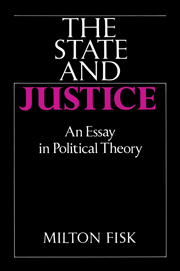Book contents
- Frontmatter
- Contents
- Preface
- Introduction: Can the state rule without justice?
- Part One An outline of a materialist political theory
- 1 A challenge to materialism
- 2 A framework for the state
- 3 The revolt against theory
- 4 State autonomy
- Part Two An assessment of the place of justice in the state
- Part Three A functional view of political institutions
- Part Four An account of the community of states
- Part Five A reflection on the transition to a new kind of state
- Conclusion: State, class, and democracy
- Notes
- Index
1 - A challenge to materialism
Published online by Cambridge University Press: 06 July 2010
- Frontmatter
- Contents
- Preface
- Introduction: Can the state rule without justice?
- Part One An outline of a materialist political theory
- 1 A challenge to materialism
- 2 A framework for the state
- 3 The revolt against theory
- 4 State autonomy
- Part Two An assessment of the place of justice in the state
- Part Three A functional view of political institutions
- Part Four An account of the community of states
- Part Five A reflection on the transition to a new kind of state
- Conclusion: State, class, and democracy
- Notes
- Index
Summary
In the 1960s the appeal to state autonomy became popular as a refutation of the materialist account of the state. This refutation focused on state activities that appear to go beyond the demands of any system that could plausibly be called material, whether environmental, technological, or economic. A pattern of justice itself would seem to contribute to state autonomy.
It is worth looking at this criticism from autonomy in order to see whether my plan to treat the state within a materialist theory is feasible. But instead of starting with justice, I shall take the case of the nuclear and conventional arms race between the United States and the Soviet Union between the 1950s and the 1980s. This will be theoretically – though certainly not politically – more manageable than the much broader case of justice itself. It has been widely noted that the spiraling arms production after 1949 is a challenge to a materialist view of the state because the spiral has climbed upward with a logic that seems to be its own. The arms race is, I shall show, a challenge to an atomist form of materialism but not to the form I shall adopt.
The independence of the arms race
Despite modest reductions in limited areas such as those called for by the Intermediate Nuclear Forces Treaty of 1988, the arms race looks uncontrolled and pointless in relation to interests outside itself.
- Type
- Chapter
- Information
- The State and JusticeAn Essay in Political Theory, pp. 16 - 28Publisher: Cambridge University PressPrint publication year: 1989



